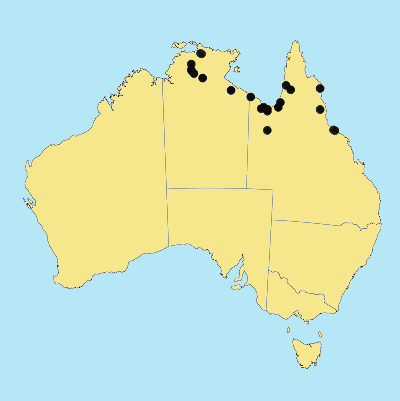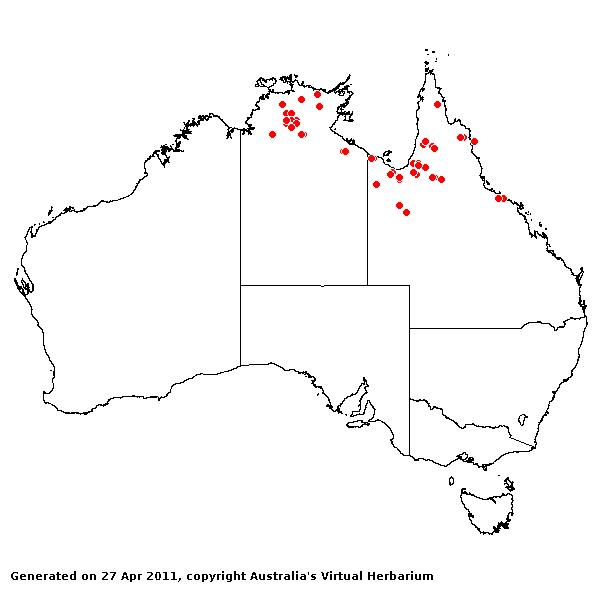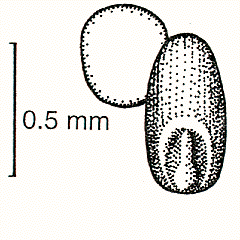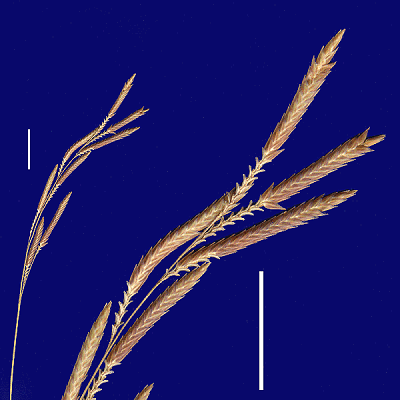Eragrostis stagnalis M. Lazarides.
Aust. Syst.
Bot. 10: 152
(1997).
Classification. (GPWG 2001) : Subfamily
Chloridoideae. Cynodonteae.
Type of Basionym or
Protologue Information: Australia,
Katherine: Beauglehole 58446 (CANB holo).
Key references
(books and floras): [2002] D.Sharp & B.K.Simon, AusGrass, Grasses of
Australia.
Illustrations:
[2005] K.Mallet (ed.), Flora of Australia 44B: Poaceae 3
(Fig. 65H-I).
Habit.
Perennial. Culms erect, stature slender to delicate, 35–95 cm tall, 3–5 -noded.
Lateral branches simple or sparsely branched. Ligule a fringe of hairs, 0.1–0.3
mm long. Leaf-blades straight, lanceolate or elliptic, flat or involute or
convolute, 1–2.8 mm wide. Leaf-blade surface scaberulous, glabrous.
Inflorescence.
Inflorescence compound, a panicle. Panicle elliptic, (10–)25–33 cm long, 6–8 cm
wide.
Spikelets.
Spikelets pedicelled. Fertile spikelets many flowered, with at least 2 fertile
florets (10–61), comprising 10–61 fertile floret(s), with diminished florets at
the apex, linear, laterally compressed, 5.4–30 mm long.
Glumes. Glumes
similar. Lower glume linear or lanceolate, membranous, keeled, 1-keeled, 1
-nerved. Upper glume linear or lanceolate, 1.2–1.8 mm long, membranous, keeled,
1-keeled, 1 -nerved.
Florets.
Fertile lemma 1.5–2 mm long, keeled, 3 -nerved. Lemma apex muticous. Palea 2 -nerved. Anthers 3. Grain 0.5–0.8 mm
long.
Continental
Distribution: Australasia.
Australian
Distribution: Northern Territory, Queensland.
Northern Territory: Darwin &
Gulf. Queensland:
Burke, Cook, North Kennedy.
Notes.
Distinguishing characters include slender habit; open drooping panicle;
biconvex caryopsis with free pericarp, and persistent zig-zag rachilla.
Endemic;
distributed in N.T. from the E Alligator R. S to Mataranka, then in the Gulf of
Carpentaria from Booroloola to the Leichhart R. in Qld, also from Cooktown S to
near Townsville. Fringing seasonally wet usually still-water habitats (lagoons,
swamps, waterholes and similar depressions, also watercourses), on floodplains
and damp flat ground; in alluvium, sand and black clays.; flowers all year
round.; fruits all year round.
